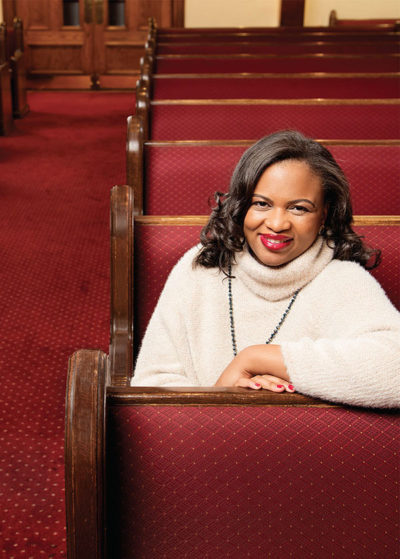
Photo: Webb Chappell
Wiljeana Glover, assistant professor of technology and operations management
When Wiljeana Glover was in college, a beloved aunt died due to a medical error. That tragedy led Glover to start thinking about health-care operations, an area that would become a focus of her career. Today, Glover is an assistant professor of technology and operations management and the faculty director of Babson’s Schlesinger Fund for Global Healthcare Entrepreneurship, a multifaceted initiative involved in research, student programs, and educational activities.
In addition to her efforts in health care, she also fills her days with praise and music. A singer and songwriter, Glover enjoys serving as the director of worship and arts at her church, Pentecostal Tabernacle, in Cambridge, Massachusetts.
You’re originally from Georgia. What do you like about Massachusetts?
My husband is a psychologist, and we jokingly call Boston the mecca of all things health care. So I think me being a health-care researcher, him being in the field, you can’t really be in a better location to learn and be challenged and be innovative. We love it.
Can you describe your research?
I study health-care systems and the intersection of operational strategies and the human perceptions of how well those operational strategies are going. When a hospital decides to try a new business model or approach to operations, I’m interested in how does that align or not align with the culture of the organization. What are the human implications? Are people excited about this, do they feel empowered by it, or do they feel limited by it?
Your work looks at integrating care. What does that mean?
I think in part I’m influenced by what happened to my aunt, a situation where one care provider had a piece of information that her surgeon didn’t have. That started me thinking about how you better coordinate care. How do you coordinate all of the players, all of the departments that need to be involved?
Medicine may be a big part of your life, but so is music.
A lot of faculty members here have an artistic or creative side. My creativity has always been in music. There are recordings of me making up songs when I was 3. And so I’ve always been a songwriter and a singer, and that’s something that I am blessed to be able to do at my church.
Tell me about your church.
I love that my church is extremely diverse. It’s a really eclectic mix of people, which forces you to think about life and faith in a very different way because everyone is coming from a different cultural background. We have a lively service. Lots of clapping, lots of singing along. A local reporter came to a service, and she said she could feel the ground moving under her feet.—John Crawford
